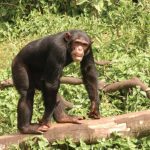PARK AT A GLANCE
Size: 1,121km²
This extinct volcano is one of Uganda’s oldest physical features, first erupting around 24 million years ago.
Mt Elgon was once Africa’s highest mountain, far exceeding Kilimanjaro’s current 5,895m. Millennia of erosion have reduced its height to 4,321m, relegating it to the 4th highest peak in East Africa and 8th on the continent.
Mt Elgon is home to two tribes, the Bagisu and the Sabiny, with the marginalized Ndorobos forced to dwell deep within the forest of Benet.
The Bagisu, also known as the BaMasaba, consider Mount Elgon to be the embodiment of their founding father Masaba and refer to the mountain by this name.
At 4,000km² Mt. Elgon has the largest volcanic base in the world. Located on the Uganda-Kenya border, it is also the oldest and largest solitary, volcanic mountain in East Africa. Its vast form, 80km in diameter, rises more than 3,000m above the surrounding plains. The mountain’s cool heights offer respite from the hot plains below, with the higher altitudes providing a refuge for flora and fauna.
Mount Elgon National Park is home to over 300 species of birds, including the endangered
Lammergeyer. The higher slopes are protected by national parks in Uganda and Kenya, creating an extensive transboundary conservation area that has been declared a UNESCO Man & Biosphere Reserve.
A climb on Mt. Elgon’s deserted moorlands unveils a magnificent and uncluttered wilderness without the summit-oriented approach common to many mountains: the ultimate goal of reaching the top of Mt. Elgon is not the final ascent to the 4321m Wagagai Peak, but the descent into the vast 40km² calderas.



